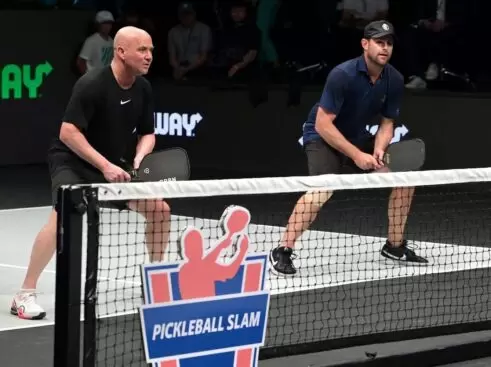The Judge: He makes a ruling on the midlife male’s tough questions
My friend needs to ask his wife for everything, like what to buy or just having a poker night, let alone taking a guys’ weekend trip. We all want to tell him to man up, but it’s not working. Anything we can tell him to stop feeling like he needs permission for everything?
I’m sure you’ve watched enough cops and law shows that you know basically how the system works—and you know how detectives break down a perp. They ask very simple questions: What were you doing on this date? Where were you? What were you wearing? Who you were with? With these little details, they piece together a narrative that tells the story of the crime.
Oftentimes, there’s one piece of evidence that’s not as simple as a suspect saying they were on 98th and Broadway at 6 p.m. on the night of the crime: the motive.
The “why.”
The “why” is the connective tissue of the whole case. With no “why,” the case may make no sense. With a strong “why,” the story points to guilt beyond a reasonable doubt.
Find the “why” and you’ll find the answer.
Your friend has committed no crime (with perhaps the exception of third-degree assault of his own balls), but he needs to take a strong look at his motive. Because I don’t get it.
Why does he feel the need to ask permission? Why does he have so little respect for himself and his relationship that he needs to grovel to play 9 holes with his pals? Why can’t he just have important conversations about making sure they both do what they can to fulfill their needs?
I don’t know his situation, but I do know that your friend has to live a life where his needs are met (just as hers should be). If he feels everything he wants needs to go through the marital appeals court, then there’s a fundamental disconnect and a lack of mutual respect.
This is very different, of course, from communicating with each other—talking about financial feasibility, scheduling conflicts, and other factors where the two of them may disagree. There’s a big difference between permission and conversation.
If I’m your friend, I start with this simple, yet fundamental, change: Stop asking questions and start making statements. I want to go to the mountains with the fellas, I want to buy a drone, I want to exchange the bed in the guest room for a pool table. Ask it as a question, which sounds like the polite thing to do, and you’ve signaled to your partner that she holds the power. “No” to this, “yes” to that.
Instead, you just communicate your needs, as she should do the same with you, and then you—news alert—fucking talk it through like adults with mutual respect for each other.
If your friend is in a position where he has to hide what he wants (or worse, asking for forgiveness after he does whatever it is that he does), then the outcome is doomed from the start.
I know so many men that feel the same way as your friend. Their wives don’t want them to take father-son trips (FOMO on their part), or they assume you’re going to do the worst on boys’ weekend that it’s just easier for them to thwart it than go through having their own doubts and insecurities.
But you talk it through, you explain your real why, and you do what you’re supposed to.
Make your case. That doesn’t mean you’ll win all of them.
But let’s be clear that your partner shouldn’t be the judge or jury. She should be your co-counsel, where you both end up feeling like you won.
What’s the best way to talk to my kids about social media without sounding too heavy-handed or trying to be “too cool”?
I know I’m a judge, and I’m probably one of the few on the bench who pays attention to what’s going on in social media. I’m not saying I post clever TikToks or argue with friends about politics on Facebook, but I know enough, and let’s leave it at that.
The easy answer—and the ones that too many parents default to—is to ban it when it goes wrong, take the phone away, and make so many restrictions that you make my job look like I’m a kitty cat. And I sentence people to prison!
That’s stupid and short-sighted, in my opinion. I’m not saying parenting is easy. In fact, it’s one of the hardest jobs on the planet. You do what you think is right. You want what’s best for your kid. You try to strike the balance between rules and freedom.
And then boom. Bikini photo on hump day (dad, I’m a teenager now!). Hateful comment draws the ire of the school principal (dad, it was a joke!). Or worse, some creepo goes a little too far and you fear for your kid’s safety.
Social media can be a dangerous place sometimes, but you also can’t ignore the fact that their phones are their lifelines. And—I know this sounds defeatist of me as someone in the legal system—they’re going to find a way around whatever restrictions you impose.
The bigger point here is that parenting isn’t science. Parents are different, kids are different, stressors are different, situations are different. What works for one doesn’t work for everyone–even with children in the same family. But what you’re ultimately trying to do is a) protect them and b) help them learn how to navigate challenges on their own.
And that applies to all kinds of complex parenting dilemmas. You’re right in the middle of navigating all the difficult parenting minefields that pop up as your children morph from the toddlers you cuddle with to the young adults you tangle with. Drinking, driving, vaping, smoking, dating. The line between “experimental” and “serious shit” is fishing-line-thin.
But social media isn’t really what this is about. It’s about finding ways to have difficult talks with your kids, no matter what you want to caution them about.
Bring up stories and cautionary tales from social media. Keep an eye on what they’re doing without stalking. Ask if they’ve seen any of their friends get into trouble with posts.
If they’re teens, they’re not always going to be super-open with everything they’re doing. But here’s the thing: The conversations can’t start once there’s trouble brewing.
They have to happen often–about big stuff, about small stuff, about what they care about, about what they want. Too often, parents bomb in with answers and advice without hearing them out, thinking about their point of view, or seeing that a child’s life today is a lot different than it was when your Atari-playing ass was a kid.
More often, maybe it’s smarter to start with your ears rather than your mouth.








